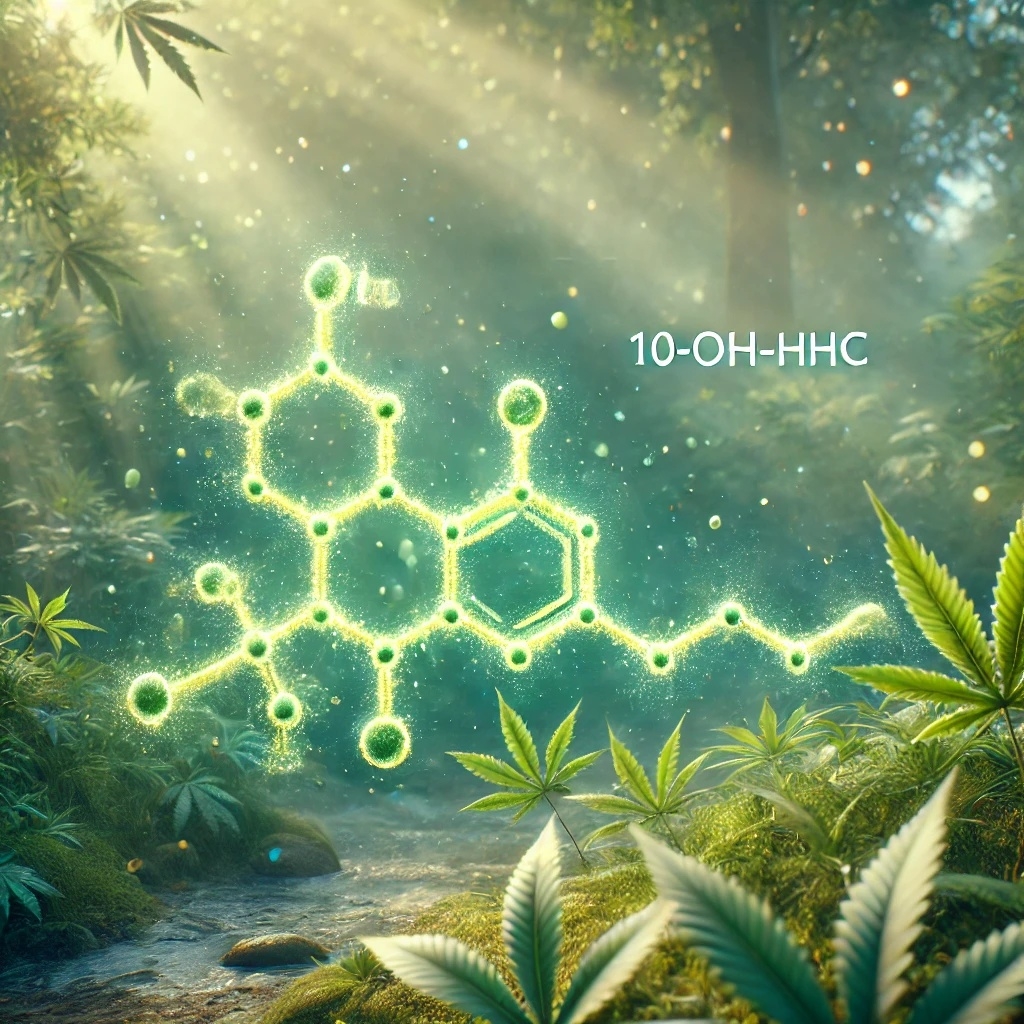10-OH-HHC: An Alternative Molecule to the Banned HHC

The world of cannabinoids is constantly evolving, with new molecules regularly emerging with intriguing properties. Among them, 10-OH-HHC stands out as an alternative to HHC, a molecule that is now banned in France. Its potential has piqued the interest of cannabinoid enthusiasts, especially those seeking a powerful CBD flower with noticeable effects.
But what exactly is this molecule? How does it work, what are its forms and effects, and most importantly, what is its legal status in France? Let's explore all the available information on 10-OH-HHC.
What is 10-OH-HHC?
10-OH-HHC (10-hydroxy-hexahydrocannabinol) is a specific derivative of HHC (hexahydrocannabinol), characterized by the addition of a hydroxyl (-OH) group. This particular chemical structure may alter how it interacts with the endocannabinoid system, potentially influencing its effects and intensity.
Like HHC, 10-OH-HHC is still under research. Current data remains limited, although some consumers are already considering it as a possible legal alternative to HHC. Its exact legal status is not yet determined, leaving many questions about its commercialization and use.
Why was HHC banned in France?
HHC quickly emerged as an alternative to THC, gaining attention for its relaxing and euphoric effects. As its popularity grew, French authorities examined its composition, potential toxicity, and associated risks.
In June 2023, France classified HHC and its derivatives (HHC-O and HHC-P) as narcotics, making them strictly prohibited. This decision was based on several concerns:
- Manufacturing process: HHC is typically obtained through the hydrogenation of THC, an industrial chemical process that raises concerns about product purity and safety.
- Lack of strict regulation: Unlike CBD, which is better documented and partially regulated, HHC remained a poorly studied and unregulated compound.
- Similarity to THC: Since its psychoactive effects were considered close to those of THC, authorities chose to ban it to prevent confusion or misuse.
According to health authorities, this measure aims to protect public health and prevent the emergence of other derivatives with uncertain legal status. In this context, 10-OH-HHC naturally raises interest but also questions about its future on the French market.
Characteristics of 10-OH-HHC
10-OH-HHC has several features that distinguish it from other cannabinoids:
- Hydroxylated derivative of HHC: A chemical modification that may affect its effects.
- Reported effects similar to HHC, though possibly milder according to early user feedback.
- Interaction with the endocannabinoid system, similar to other cannabinoids like THC and CBD.
- Various available forms, including infused flowers, oils, and e-liquids.
- Unclear legal status, with potential future regulations in Europe and France.
HHC and other cannabinoid families
10-OH-HHC belongs to the vast cannabinoid family, which includes a wide range of molecules with different properties. Among the most well-known are THC (tetrahydrocannabinol), famous for its psychoactive effects, and CBD (cannabidiol), known for its relaxing properties and lack of intoxicating effects.
HHC was marketed as a legal alternative to THC before being banned in France. Now, other molecules are emerging, such as 10-OH-HHC and the powerful H4CBD molecule, a hydrogenated CBD derivative that intrigues researchers with its potential effectiveness.

The different forms of 10-OH-HHC
To meet the expectations of a curious audience, manufacturers are exploring different ways to offer 10-OH-HHC:
- Infused flowers: CBD flowers enriched with 10-OH-HHC for a more pronounced effect than CBD alone.
- Resins and pollens: Concentrates with high cannabinoid levels, prized for their prolonged action.
- Oils: Typically used sublingually, allowing for gradual absorption and precise dosing.
- E-liquids: Suitable for vaporization, providing relatively fast effects through inhalation.
- Gummies and other edibles: A discreet and enjoyable option, with a slower onset but often longer-lasting effects.
This variety reflects the effort to cater to individual preferences, although the availability of 10-OH-HHC may change depending on future regulations.
What are the effects of 10-OH-HHC?
Information on 10-OH-HHC mainly comes from early consumer reports and a few exploratory studies:
- Relaxation and well-being effects similar to HHC, possibly at a lower intensity.
- Mild euphoric effect and potential mood enhancement.
- Stress and anxiety reduction, according to some users.
- Slight cognitive or physical stimulation at low doses.
- Few reported negative effects so far, though research is still limited.
At Marie Jeanne, we believe it is essential to remain cautious until more thorough research is conducted. Effects can vary significantly between individuals, and the lack of extensive studies makes it difficult to establish a clear safety profile.
Is 10-OH-HHC legal in France?
As of February 2025, 10-OH-HHC is not officially banned in France. However, since HHC and its close derivatives were classified as narcotics, it is possible that this molecule will face the same fate if its similarities to HHC are confirmed.
Health authorities and regulatory bodies are closely monitoring the emergence of new cannabinoid substances. If 10-OH-HHC exhibits effects or a chemical structure too similar to THC or HHC, a ban or strict regulation could follow in the short or medium term.

Does Marie Jeanne CBD sell 10-OH-HHC?
At Marie Jeanne CBD, our priority is to comply with regulations while ensuring the quality and safety of our products. We closely follow legal developments and scientific studies related to new cannabinoids.
Currently, we have chosen not to sell 10-OH-HHC. This decision is based on a precautionary approach: until its legal status is clarified and more research confirms its safety, we prefer to focus on safe, legal, and well-documented products.
Conclusion
10-OH-HHC is generating curiosity for its potential properties and similarity to HHC. However, the scientific and legal uncertainties surrounding it call for caution. Consumers looking for new experiences should remain vigilant given the lack of reliable data.
At Marie Jeanne CBD, we will continue to monitor market and research developments. Our commitment remains unchanged: to offer transparent, law-compliant, and health-conscious products.
To stay updated on the latest cannabinoid news, be sure to check our blog regularly!
